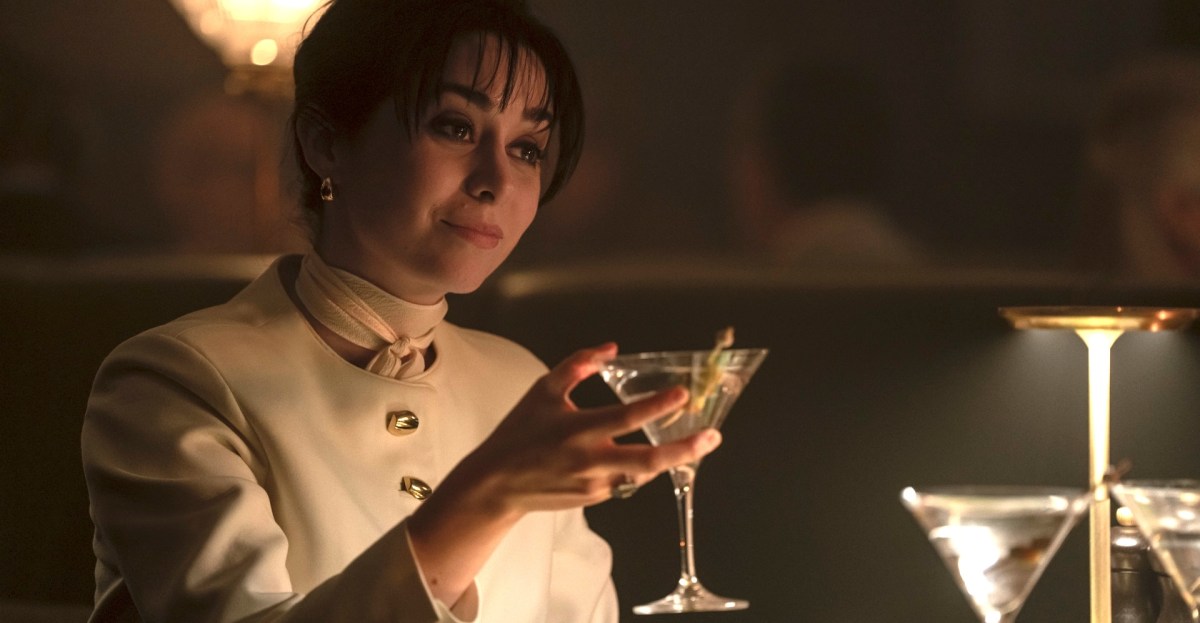Max’s The Penguin isn’t the first TV series to come from Hollywood’s fascination with Gotham City’s seedy underbelly, but it might be the one most committed to staying away from any whiff of Batman or Arkham Asylum’s monikered rogues’ gallery. Case in point: Even its one Arkham patient, Sofia Falcone, aka the Hangman, is straight out of Batman’s great mafia fiction era.
[Ed. note: This piece contains spoilers for The Penguin’s premiere episode, “After Hours.”]
The Penguin introduces Sofia Falcone, daughter of the Falcone crime family played by actor Cristin Milioti, as maybe the scariest player jostling for the Falcone crown. Sofia could be a shoo-in to follow her father’s death in 2022’s The Batman and her brother’s demise in The Penguin’s premiere, but her path is hampered by general mafia sexism, and also the perception that she’s not mentally fit to be a boss.
Sofia, Penguin tells us, just got out of Arkham Asylum, and, in a past life, she committed a string of murders. But who did she kill, and why did it earn her the nom de guerre of “the Hangman”? The Penguin hasn’t laid out its own answers to that just yet — but the DC Comics stories that Sofia originated in have.
A little on Sofia Falcone in DC Comics
Sofia first appeared in Batman: The Long Halloween, a 1996 miniseries from writer Jeph Loeb and artist Tim Sale that’s one of the best Batman mystery stories to grace the page and indisputably one of the most cinema-influential modern Batman comics. Long Halloween followed Batman and other characters as they sought the real identity of the serial killer Holiday, who preyed on members of Gotham’s mafia elite. Sofia comes in about halfway through the story, right after she gets out of prison.
Regular prison, that is, not Arkham Asylum. Rather than the family pariah, Long Halloween’s Sofia is Carmine Falcone’s beloved daughter and best enforcer. Also she’s, like, a total brick shithouse nicknamed “Sofia Gigante.”
Sofia wouldn’t get her serial killer cred until Long Halloween’s sequel, Batman: Dark Victory, where she turned out to be the mysterious serial killer the Hangman. That’s a huge spoiler for Dark Victory, but, well, blame The Penguin, not us.
Who did the Hangman kill?
As the Hangman, Sofia preyed on police and other law enforcement figures (largely corrupt ones, because this is Gotham City). She would surprise her victims with a noose and leave them hanging in plain sight, with her calling card pinned to their chest: half-finished hangman games, scrawled on papers taken from Harvey Dent’s pre-villain-turn office desk.
The point of it all was revenge: At the climax of The Long Halloween, Harvey (as Two-Face) had executed her father, Carmine Falcone, and all of Hangman’s victims were people who had helped Harvey build his career. Sofia, who had survived a fall from Carmine’s rooftop penthouse at the end of Long Halloween, escaped suspicion for most of the story by pretending that the fall had paralyzed her from the neck down.
The Penguin isn’t the first “grounded” Batman TV series to tap Sofia for the spotlight — Crystal Reed (Teen Wolf) played her for multiple seasons of Gotham. She’s a natural fit for a series looking to play around with succession in the Falcone family and dabble in a more traditional true-crime sort of supervillain. Sofia dies at the hands of Two-Face at the end of Dark Victory, so her comics presence has remained contained within it and The Long Halloween.
In addition to being mystery stories, and serving as origin tales for Two-Face and Robin, Long Halloween and Dark Victory asked the question: “But how, exactly, did Gotham City transition from the mafia-dominated underworld of Batman: Year One to the chaotic, theatrical crime sprees of a loose community of costumed murderers?” Part of that transition, Loeb and Sale put forward, was that the scions of Gotham’s great crime families turned to serial murder and calling cards themselves.
But is The Penguin also interested in following that particular transition, or will it maintain its commitment to staying away from Batman’s monikered rogues? That’s for the rest of the miniseries’ episodes to show us.











Comments are closed